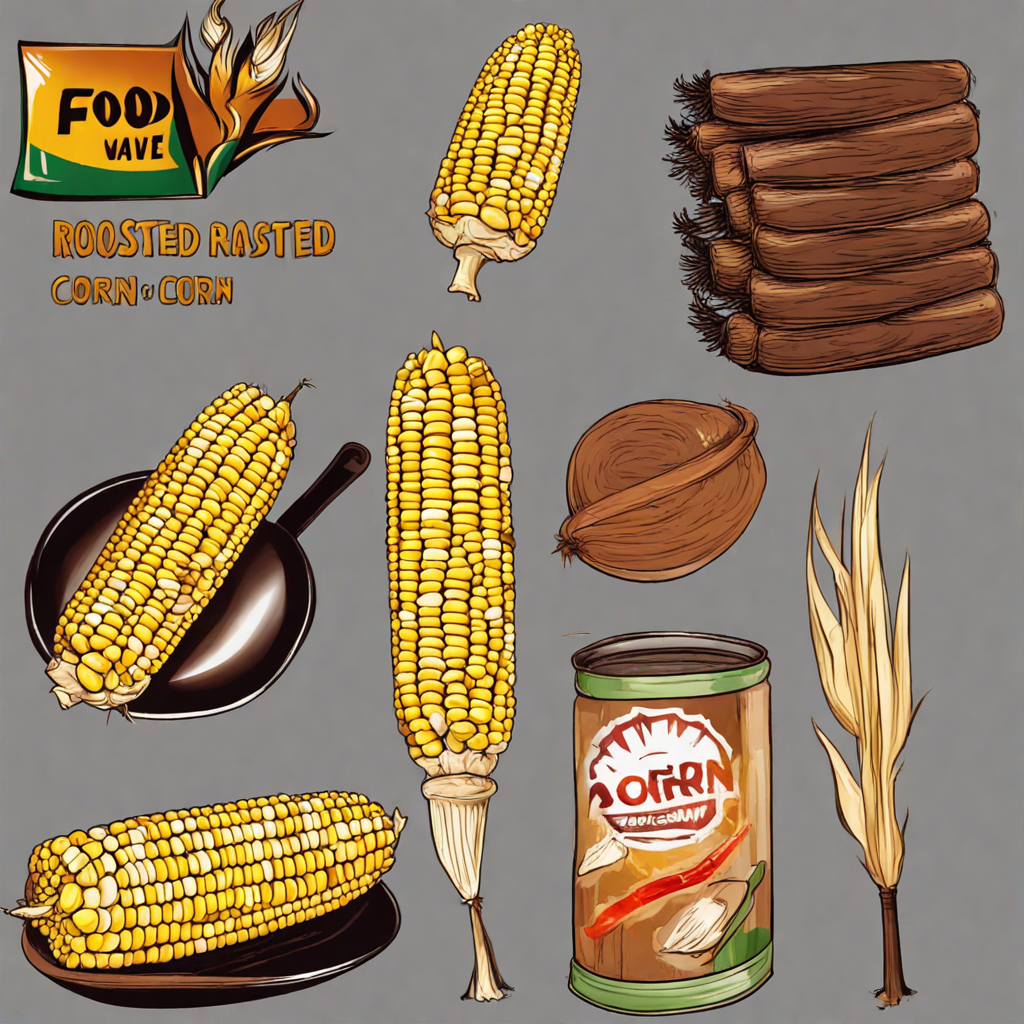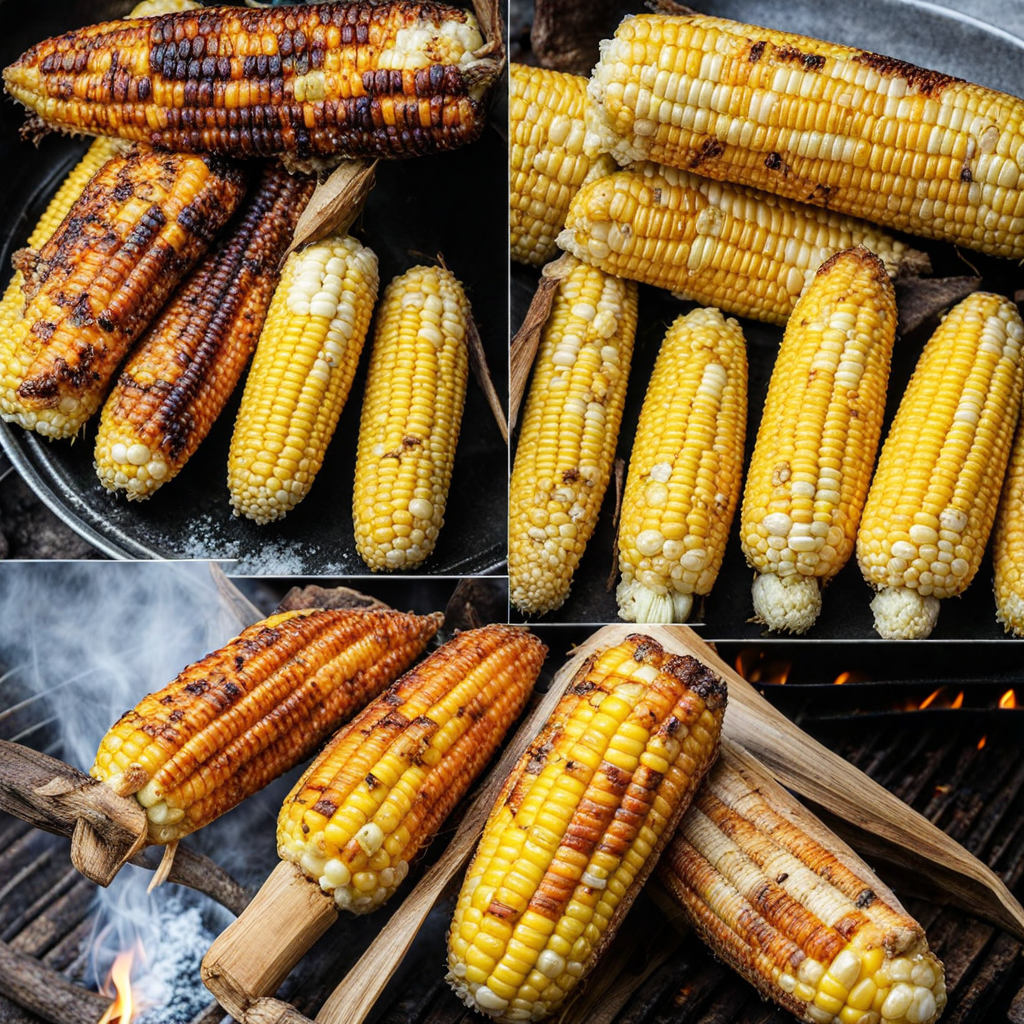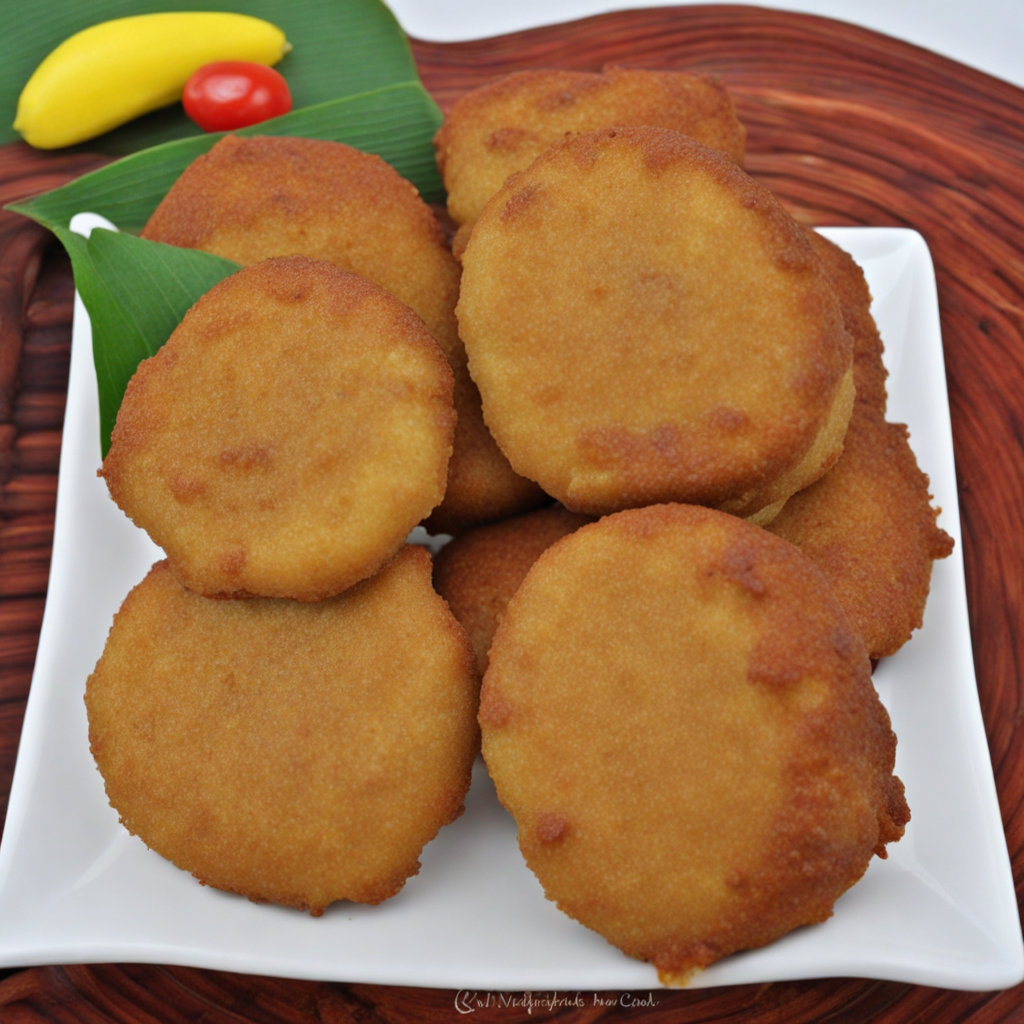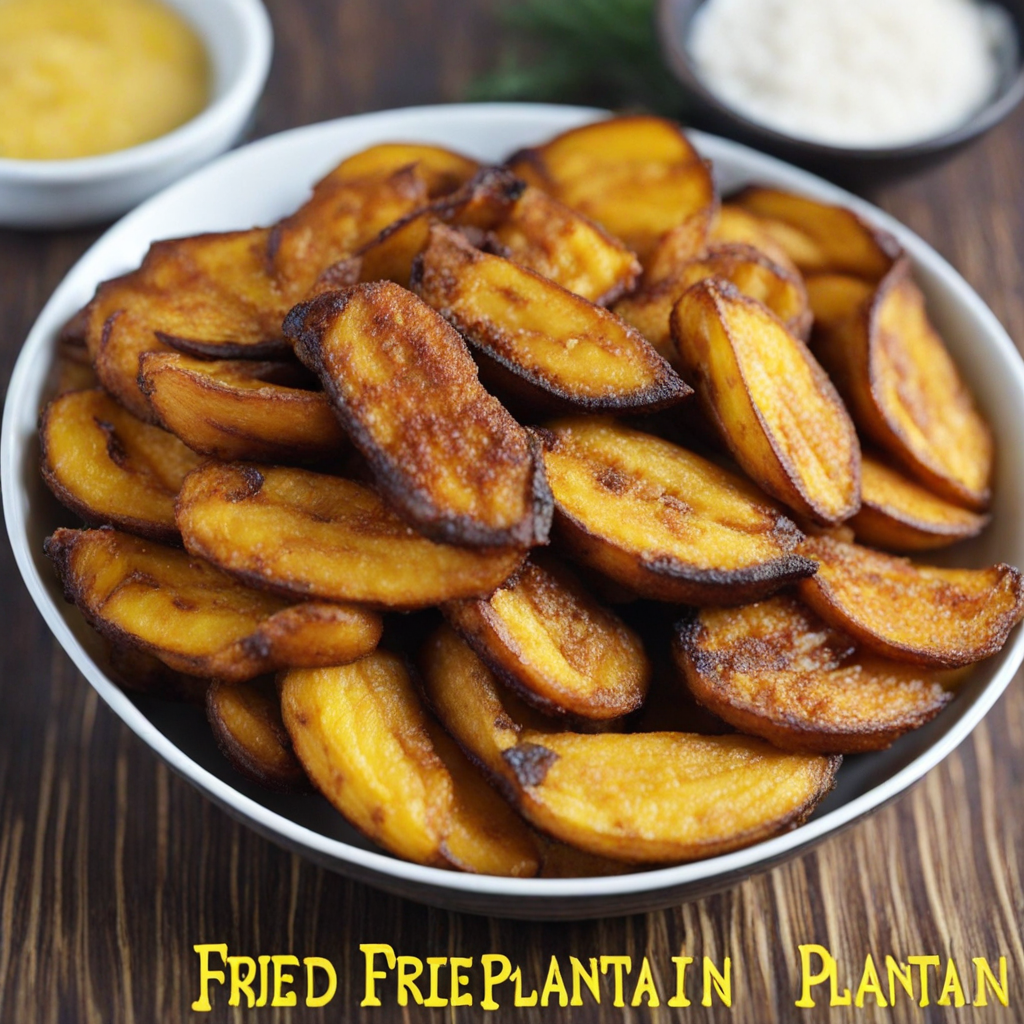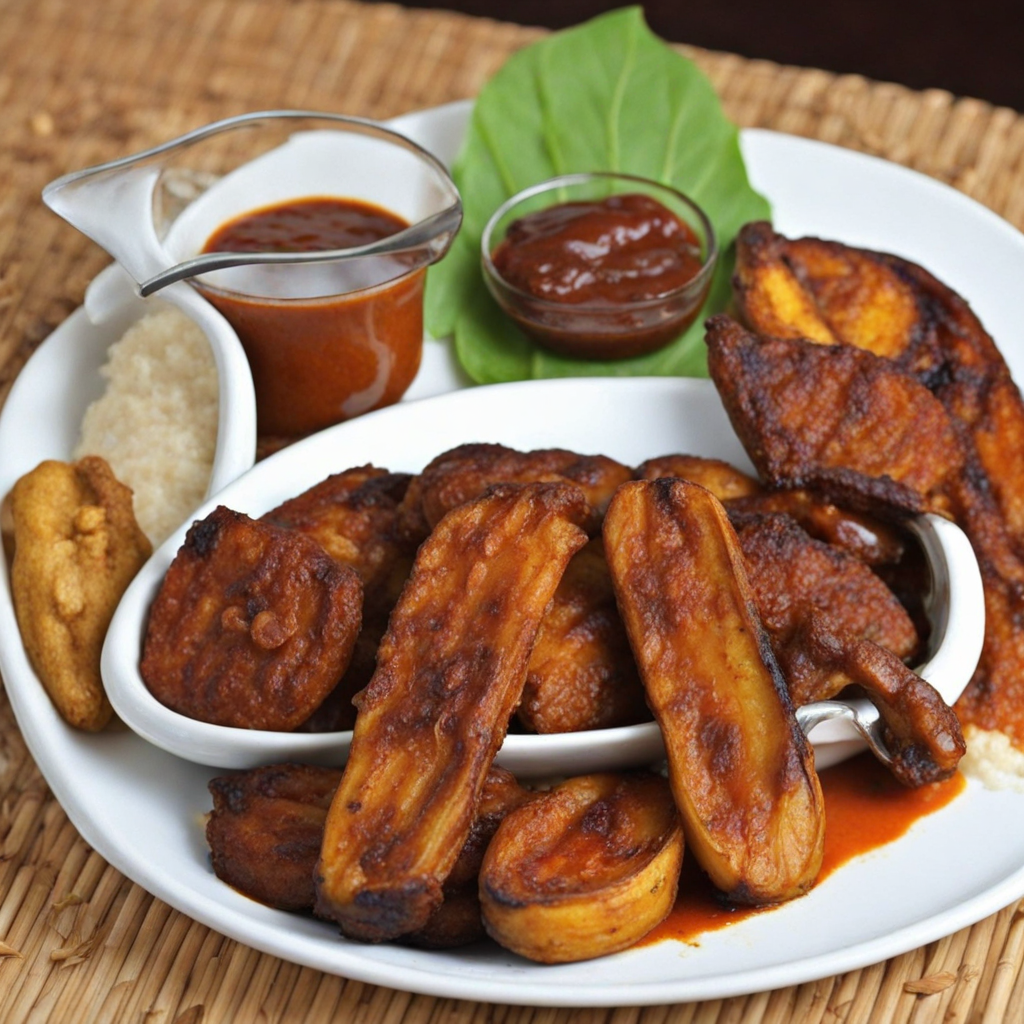Roasted Corn
Roasted corn, known as "Okpa Ede" in Nigeria, is a delightful street food that captures the essence of the country's vibrant culinary scene. The process begins with selecting fresh, plump ears of corn, usually harvested at the peak of ripeness. Vendors roast the corn over an open flame or hot coals, allowing the natural sugars within the kernels to caramelize, resulting in a slightly charred, smoky flavor that enhances its sweetness. The enticing aroma wafts through the air, drawing people in as they eagerly await their turn to indulge in this wholesome snack. As the corn roasts, the kernels become tender and juicy, while the outer husk develops a crispy texture. Once cooked to perfection, the corn is often served on the cob, sometimes with a sprinkle of salt or a drizzle of spicy pepper sauce to elevate the taste. The contrast of the smoky exterior with the sweet, juicy interior creates a captivating flavor profile that is both comforting and satisfying. Roasted corn is not just a snack; it is a cultural experience that brings people together, often enjoyed in communal settings or at bustling roadside stalls. In Nigeria, roasted corn is frequently accompanied by other traditional snacks, such as coconut or groundnuts (peanuts), creating a delightful combination of tastes and textures. This simple yet flavorful dish reflects the country's rich agricultural heritage and culinary creativity. Whether enjoyed as a mid-afternoon snack or a late-night treat, roasted corn is a beloved staple that embodies the warmth and hospitality of Nigerian culture, inviting everyone to share in its deliciousness.
How It Became This Dish
The History of Roasted Corn in Nigeria Roasted corn, known as "Omi Obe" or "Boli" in various Nigerian dialects, is a beloved street food that holds a significant place in the culinary landscape of Nigeria. Its simple preparation and rich flavors encapsulate the essence of Nigerian life, making it more than just a snack—it is a cultural emblem that reflects the country’s agricultural heritage, social practices, and communal bonds. #### Origin and Agricultural Roots The origins of roasted corn in Nigeria can be traced back to the indigenous agricultural practices of the West African region. Maize (Zea mays), the primary ingredient for roasted corn, was introduced to Africa from the Americas during the Columbian Exchange in the 16th century. Despite its foreign genesis, maize quickly adapted to the local climate and soil, becoming a staple crop in Nigeria by the 18th century. Nigerian farmers embraced maize cultivation due to its versatility and high yield, leading to its prominence in various regions, particularly in the southern and central areas of the country. This adaptability was crucial, as maize could thrive in different types of soil and withstand varying rainfall patterns. The crop became integral to local diets, serving not only as food but also as a source of income for many families. #### Cultural Significance Roasted corn holds a cherished place in Nigerian culture, particularly among the Yoruba and Igbo ethnic groups. Traditionally, it is associated with communal gatherings and celebrations. The act of roasting corn, typically done over an open flame, fosters a sense of community, as vendors often gather in bustling markets or by the roadside, calling out to passersby. The aroma of corn roasting over charcoal is irresistible, luring people from afar. In addition to its role in social gatherings, roasted corn is often enjoyed during festivals and ceremonies. For instance, during the harvest season, families come together to celebrate the bountiful maize crop, and roasted corn is commonly served as a symbol of gratitude and abundance. It is also a popular snack during the rainy season, as vendors set up stalls to cater to the influx of people seeking warmth and comfort from the deliciously smoky flavor of the roasted kernels. Moreover, roasted corn plays a role in Nigeria's culinary identity. It is often served alongside coconut, pear (African pear), or even pepper sauce, creating a unique eating experience that showcases the country’s rich flavors. This combination highlights the importance of using locally available ingredients and reflects the resourcefulness of Nigerian cooks. #### Development Over Time The preparation of roasted corn has evolved over the years, influenced by urbanization, globalization, and culinary innovations. Traditionally, corn was roasted on open fires, with vendors using simple equipment made from clay or metal to create a makeshift grill. As cities expanded and the demand for street food grew, the roasting process adapted to incorporate modern techniques and equipment. In urban centers like Lagos, Abuja, and Port Harcourt, roasted corn has become a staple street food, available from various vendors who often set up stalls in strategic locations—near markets, parks, and busy roadways. These vendors are not only purveyors of food but also custodians of culture, sharing stories and connecting with their customers through food. The introduction of mobile carts and electric grills has also transformed the way roasted corn is prepared and sold. While traditional methods remain popular, these advancements have allowed vendors to serve a larger customer base and ensure a consistent quality of roasted corn. Additionally, the use of spices and seasonings has expanded, with some vendors experimenting with flavors to cater to diverse palates. Globalization has also influenced the presentation of roasted corn. In the past, it was often a no-frills snack, served simply as is. Today, it is not uncommon to find roasted corn served in more elaborate ways—paired with gourmet toppings, infused with spices, or even featured in fusion dishes. This evolution reflects a growing trend among younger Nigerians who seek to reinvent traditional foods while honoring their cultural heritage. #### Economic Impact In addition to its cultural significance, roasted corn serves as a vital source of livelihood for many Nigerians, particularly women and young entrepreneurs. The relatively low cost of maize and the minimal investment required to start a roasting business make it an accessible option for many. Roasted corn vendors often work long hours, serving customers from dawn until dusk, and their presence contributes to the vibrancy of local economies. The economic impact of roasted corn extends beyond the vendors themselves. It stimulates the entire supply chain, from local farmers who grow the maize to those who sell accompanying ingredients like coconut and pepper. This interconnectedness showcases the importance of traditional foods in fostering economic resilience in local communities. #### Challenges and Resilience Despite its popularity, the roasted corn business faces challenges, particularly in urban areas. Issues such as food safety regulations, competition from fast-food chains, and changing consumer preferences pose risks to traditional street food culture. However, many vendors have shown remarkable resilience, adapting to changing market dynamics while preserving the essence of what makes roasted corn a cherished dish. In recent years, there has been a resurgence of interest in traditional foods, driven by a growing appreciation for local cuisines and sustainable eating practices. This trend has provided roasted corn with a new lease on life, as both locals and tourists seek authentic culinary experiences. Food festivals and cultural events often feature roasted corn, allowing it to reclaim its place in the spotlight. #### Conclusion Roasted corn in Nigeria is far more than just a simple snack; it is a symbol of cultural identity, community, and resilience. Its rich history, rooted in agricultural practices and culinary traditions, reflects the dynamic interplay between food and culture in Nigerian society. As the world continues to evolve, roasted corn stands as a testament to the enduring power of traditional foods, reminding us of the importance of celebrating our culinary heritage while embracing innovation. Thus, it remains an integral part of Nigeria's food landscape, cherished by many for its simplicity, flavor, and the stories it carries through time.
You may like
Discover local flavors from Nigeria


